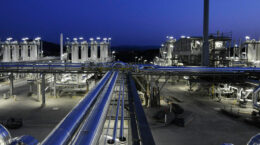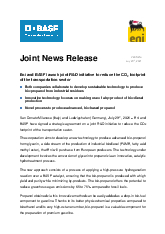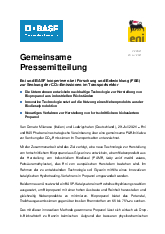Eni and BASF launch joint R&D initiative to reduce the CO2 footprint of the transportation sector
- Both companies collaborate to develop sustainable technology to produce bio-propanol from industrial residues
- Innovative technology focuses on making use of a by-product of bio-diesel production
- Novel process to produce advanced, bio-based propanol
San Donato Milanese (Italy) and Ludwigshafen (Germany), July 29th, 2021 – Eni and BASF have signed a strategic agreement on a joint R&D initiative to reduce the CO2 footprint of the transportation sector.
The cooperation aims to develop a new technology to produce advanced bio-propanol from glycerin, a side stream of the production of industrial biodiesel (FAME, fatty acid methyl ester), that Eni will purchase from European producers. The technology under development involves the conversion of glycerin to propanol via an innovative, catalytic hydrotreatment process.
The new approach consists of a process of applying a high-pressure hydrogenation reaction over a BASF catalyst, ensuring that the bio-propanol is produced with a high yield and purity while minimizing by-products. The bio-propanol offers the potential to reduce greenhouse gas emissions by 65 to 75% compared to fossil fuels.
Propanol obtained via this innovative method can be easily added as a drop-in bio-fuel component to gasoline. Thanks to its better physicochemical properties compared to bioethanol and its very high-octane number, bio-propanol is a valuable component for the preparation of premium gasoline.
Making the best use of the increasing glycerin production
More than half of the world’s glycerin production originates as a by-product of the biodiesel industry: every ton of biodiesel produces approximately 10% glycerin. As a result of increasing biodiesel production, the world’s glycerin production increased from 200,000 t/y in 2003 to approximately 5,000,000 t/y in 2020. Being a vegetable residue, glycerin is classified as an advanced bio-feedstock, according to the European RED II directive (Renewable Energy Directive, Annex IX part A).
“We are proud to support the development of the advanced bio-propanol by contributing the best catalyst, with high efficiency and a long lifetime. The opportunity to collaborate with strong industry partners like Eni is a major driver for innovation and growth for us,” says Detlef Ruff, Senior Vice President, Process Catalysts at BASF.
“Glycerin-to-advanced-bio-propanol technology is part of Eni’s Research and Development commitment towards decarbonisation. This collaboration, which allows us to accelerate innovation and dramatically decrease time to market, is consistent with Eni’s strategy for the development of “advanced generation” biofuels supply chains from feedstocks that do not compete with food supply chains.“ says Luisa Lavagnini, Head of Research & Technological Innovation at Eni.
Kerstin Hoffmann
Media Relations
BASF SE
67056 Ludwigshafen
http://www.basf.com
+49 621 60-29875
Send emailEni
Press Office
ENI
Tel. +39.0252031875 – +39.0659822030
Freephone for shareholders (from): 800940924
Freephone for shareholders (from abroad): +80011223456
Switchboard: +39-0659821





